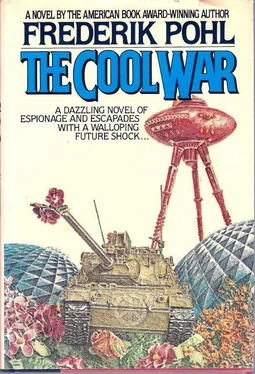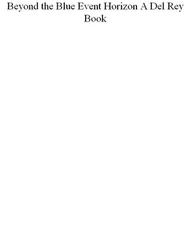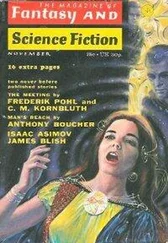“No,” he said, and then, with more conviction, “Oh, no. Go ahead. I was just thinking about something.” What he had been thinking about was that if Yosper reported to Curmudgeon, he would surely report that Hake was doing a little unauthorized digging. But the second thought was, why not? He hadn’t been told not to be curious. And one of the things he was curious about was how Yosper would react.
Which turned out to be not at all. The man took the napkin out of his lap, dropped it on the table and waved away the plate the proprietress was bringing over from the mahogany sideboard. “You know,” he said, “I don’t think this is exactly what I’m in the mood for. What do you think, Dieter? Want to try the Hofbrauhaus?”
“Good idea, Yosper,” said Dieter enthusiastically—or Carlos; and all the others followed suit.
Alys said wanly, “Should we come too?”
“No. You wouldn’t like it.”
“Are you sure?”
He cocked his head at her—with his beard and bald head, he was beginning to look like a marmoset, Hake thought. “They have some, uh, private meetings. But,” he said cunningly, “the food’s remarkable. Sausage you wouldn’t believe. Big mugs of beer. And Schweinefleisch\ Pork, all pink and white, with that red cabbage and potato dumplings, and all that rich, fat gravy—”
Alys dropped her spoon. “Excuse me,” she said, fleeing.
Yosper grinned at Hake. “Looks like she lost her appetite.”
“Yeah. I’ll tell you, Yosper,” Hake said. “Actually, I don’t feel too fine myself. I think I’ll skip dinner and turn in early…”
At least he wasn’t sick to his stomach. Grateful for that, he chained the door to his room and opened the papers Alys had given him: A London Times, a two-day-old Rome Daily American, the international edition of Newsweek. Besides reading material, he had a secret treasure of his own: two shot-sized bottles of whiskey sours, acquired on one of the many flights when he didn’t have time to drink them. Rock and rye was good for a cold, he reasoned. Who was to say whiskey sours weren’t too?
They went down. And, surprisingly, they stayed down. They made him feel—well, not better. But at least different.
The buzz from the whiskey flavored the misery from the cold, or whatever, enough at least to make a change.
He thumbed through the news, for conscience’s sake more than interest’s:
The tax on liquid hydrogen was going up fifty percent “to finance research on making America fuel-independent within the next thirty years.” The mad killer who had fire-bombed twenty-two Chicago women wearing mood rings had been caught, and announced God had told him to do it. International Harvester had delivered its 10,000th Main Battle Tank, Mark XII, direct from the production line to the U.N. scrapping grounds in Detroit. The President declared that the bargaining-counter production rate was insufficient for the needs of upcoming disarmament talks, and proposed a special bond issue to finance 5,000 additional advanced warplanes to be built and scrapped within the next five years. (He also mentioned that the income tax would have to go up to pay for the bonds.) The microwave receivers in Texas had to be shut down for ten days because of excessive damage to the Van Allen belts; as a result coastal Louisiana was battling its heaviest spring blizzard and most of Oklahoma, Texas and New Mexico were without power.
A normal enough week in America. Alys had also marked European news, but Hake didn’t really care enough to read it. He had seen enough griminess and grittiness in the past fifteen days to decide that the Europeans were not really any better off than the people in Long Branch, New Jersey, as far as the quality of life was concerned.
And besides, the quality of his own life was not seeming very good just then. The whiskey sours might have been a mistake.
Dizzily he got up and peered at himself in the mirror.
He really felt sick. Being sick alarmed Hake to a degree that a man who had been well all his life might hardly understand. He inspected his tongue (reasonably pink), his eyes (everything considered, not really very red), and wished he had something to take his temperature with.
Maybe all he needed was a little more sleep, and, to be sure, a hell of a lot more exercise. He hadn’t been able to pack his barbells. He studied his belly, looking for a sign of a paunch; his dorsals, for a hint of flab. None there—yet. But he had missed two weeks’ jogging and a dozen judo lessons on this trip, and how long could he continue to do that without penalty? He resolved to try to trap at least one of the Ocean Grovers into at least a Ping-Pong game the next morning.
But in the morning he was in no shape to do it, even if it hadn’t been Sunday and the girls off at the American school or disrupting some unfortunate church.
He bathed, shaved, dressed and unsteadily left the pension to seek a drugstore. Within three blocks he passed two of them. Both were closed, but at least they gave him the name of what he was looking for. He excused himself to an elderly gentleman sunning himself on a doorstep and asked, “Bitte, wo bist eine Apotheke?” He had to repeat it twice before he got an answer, and then the words that came back at him were not helpful. But the pointed finger was.
The druggist was a young woman who wore her red hair in ringlets. She spoke no English, nor Hebrew, nor any of the varieties of Arabic Hake summoned up. If the kibbutzim had not been so strict in their customs he might at least have had a little Yiddish to try on her. But all he had going for him was ingenuity. After that had failed four or five times it occurred to him to cough dramatically against the back of his hand and pantomine drinking from a bottle. “Ja, ja!” cried the druggist, enlightened, and reached him something off the shelf.
Blearily Hake peered at the label. Of course, it was all in German.
Antihistamin-Effekt seemed understandable enough. But what was a Hustentherapeutikum? The names of the ingredients were easier to read. Science is a universal language, and by adding a few letters and subtracting some he managed to figure out some of the things that were in the bottle. The difficulty with that was that Hake was no pharmacist, and exactly what maladies were Natriumcitrat and Ammoniumchlorid good for? When he came to the dosages he felt himself on more solid ground. Erwachsene had to mean “for adults” (if only because the column next to it was headed Kinder). And 1-2 Teeloffel alle 3-4 Stunden seemed to reveal itself.
While he was hesitating, a tall woman in a floppy hat came into the store and began peering thoughtfully at a display of cosmetics. Hake rehearsed the entire rest of his German vocabulary three or four times, and then crossed over to her for help. “Bitte, gnadige Frau,” he began. “Sprechen-sie English?”
She turned to look at him.
The face under the floppy hat was one he had last seen in a Maryland kitchen. “Pay the lady, Hake,” she said. “Then let’s you and I go where we can talk.”
If the drugstores seemed to want to close on Sundays, the bars did not. They found a sidewalk cafe, chillier than Hake would have preferred but at least remote from other people, and the woman ordered them both big brandy-snifters of raw Berlin beer with raspberry syrup at the bottom of each glass. Hake took what he estimated to be a 2-Teeldffel swig of the Hustentherapeutikum and washed it down with beer. The cold was gratifying on his palate. The taste, less so. It wasn’t what his body wanted, and the pressure in his gut increased. He felt as if he wanted to burp, but was afraid to risk it. He said. “You know, young lady, I could have you arrested.”
Читать дальше












